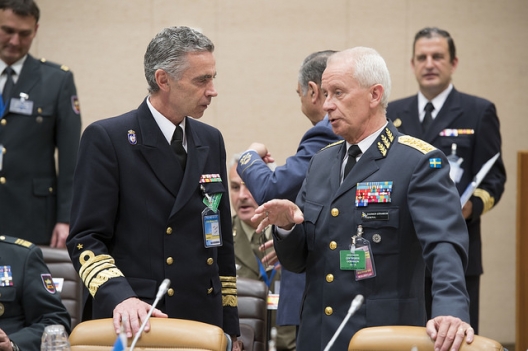 Sweden and Finland stopped being neutral years ago. They both participate in NATO exercises, commit troops to its rapid-reaction force, took part in peacekeeping operations in Bosnia and Kosovo, joined the fight in Afghanistan and, in the case of Sweden, even got involved in the 2011 air war in Libya. . . .
Sweden and Finland stopped being neutral years ago. They both participate in NATO exercises, commit troops to its rapid-reaction force, took part in peacekeeping operations in Bosnia and Kosovo, joined the fight in Afghanistan and, in the case of Sweden, even got involved in the 2011 air war in Libya. . . .
Yet they do not enjoy the biggest benefits of NATO: a seat at the decision-making table and the protection afforded by Article 5, the clause that defines an attack on one as an attack on all. This did not matter much when Russia was a “partner” and neutrality, or rather non-alignment, was a badge of national identity. But Vladimir Putin’s aggression towards Ukraine is forcing a reassessment.
This is especially true in Finland, once part of the Russian empire. Alexander Stubb, who is about to take over as prime minister, made clear his wish to push for NATO membership with the aim of “maximising Finland’s national security”. He was elected this week as leader of the conservative Kokoomus party, succeeding Jyrki Katainen, who is moving to the European Commission. Nothing will happen immediately, as the current five-party coalition excludes moves towards NATO. But Mr Stubb said the country needed a “comprehensive debate” after next April’s general election and, if he wins, he seems determined to lead it. . . .
The climate would change if Sweden, the Nordic “big brother”, moved towards NATO. Sweden is increasing defence spending. Its 2009 “solidarity declaration” says Sweden will “not be passive” if an EU or Nordic country is attacked. Its foreign minister, Carl Bildt, has been very active in the Ukraine crisis, as one of the prime advocates of a close partnership between the EU and Ukraine. But despite some debate about NATO membership, a recent parliamentary commission report shied away from the issue. And the centre-right government, more favourable to NATO than the centre-left, is expected to lose an election in September. . . .
Finnish and Swedish membership would enhance security by turning the Baltic into a NATO lake.
Might Russia throw a dangerous hissy fit? It is telling that Sweden’s semi-neutrality did not prevent Russian bombers last year from staging a mock attack (it was NATO planes, not Swedish ones, that scrambled to meet them). The Swedish chief of staff subsequently declared that his forces could defend only a small part of the country against Russian attack, for a week at best. NATO bluntly told Sweden that, without being a full member, it could not expect the allies to come to its defence. Russian belligerence only strengthens the case for NATO membership.
Image: Swedish Chief of Defense Gen. Sverker Goranson (on right) at NATO headquarters, May 21, 2014 (photo: NATO)
